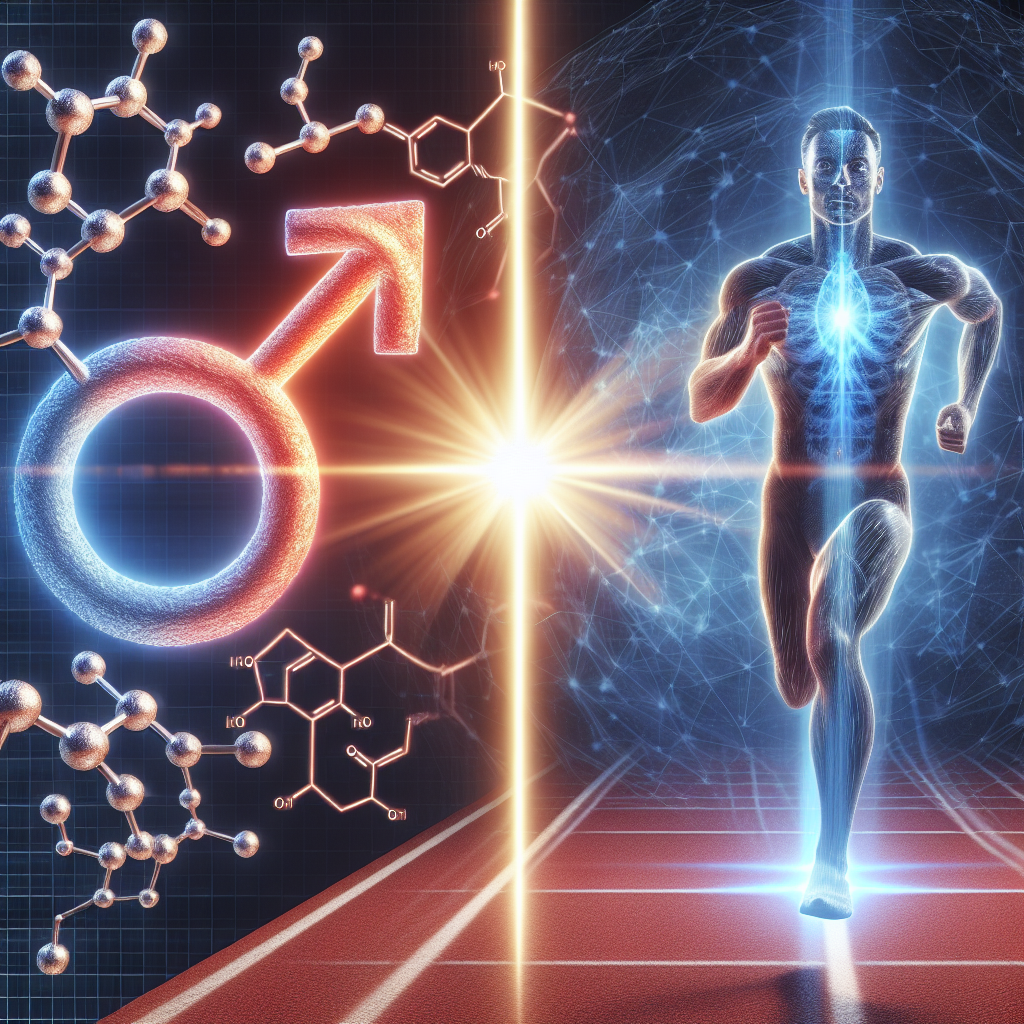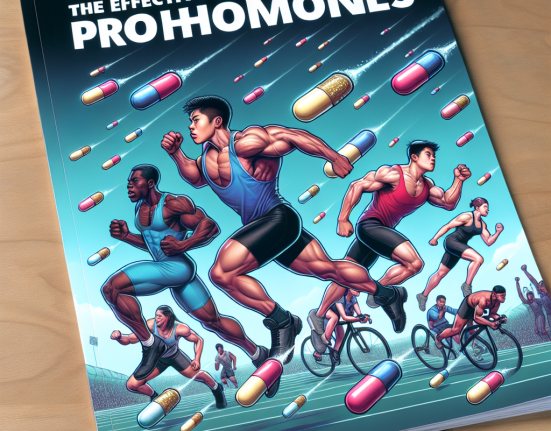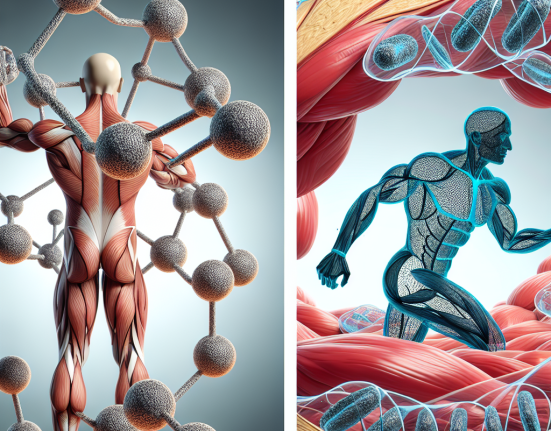-
Table of Contents
Testosterone and Physical Endurance: Unveiling the Benefits
Testosterone is a hormone that is primarily associated with male characteristics such as muscle mass, strength, and physical endurance. However, recent research has shown that testosterone can also play a significant role in enhancing physical endurance in both men and women. In this article, we will delve into the benefits of testosterone in improving physical endurance and its potential implications in the field of sports pharmacology.
The Role of Testosterone in Physical Endurance
Testosterone is a steroid hormone that is produced primarily in the testes in men and in smaller amounts in the ovaries and adrenal glands in women. It is responsible for the development of male characteristics during puberty, such as deepening of the voice, growth of facial and body hair, and increased muscle mass and strength.
But beyond its role in sexual development, testosterone also plays a crucial role in regulating energy metabolism and muscle function. It stimulates the production of red blood cells, which are responsible for carrying oxygen to the muscles, and also increases the production of growth hormone, which aids in muscle repair and growth.
Furthermore, testosterone has been shown to increase the production of mitochondria, the powerhouse of the cell, which is responsible for producing energy for muscle contractions. This means that higher levels of testosterone can lead to increased energy production and improved physical endurance.
The Benefits of Testosterone in Physical Endurance
Studies have shown that testosterone supplementation can have a significant impact on physical endurance. In a study conducted by Bhasin et al. (2001), it was found that men who received testosterone injections for 20 weeks had a 5% increase in muscle mass and a 10-13% increase in muscle strength compared to the placebo group. This increase in muscle strength and mass can directly translate to improved physical endurance.
Moreover, testosterone has been shown to improve muscle recovery and reduce muscle damage after intense exercise. In a study by Kraemer et al. (2006), it was found that testosterone supplementation reduced markers of muscle damage and inflammation after a high-intensity resistance training session. This means that individuals with higher levels of testosterone may experience less muscle soreness and fatigue, allowing them to train harder and longer.
Additionally, testosterone has been linked to improved bone density, which is crucial for athletes who engage in high-impact activities. A study by Snyder et al. (1999) found that testosterone supplementation in older men increased bone mineral density and reduced the risk of fractures. This can be beneficial for athletes who are at a higher risk of bone injuries due to their intense training regimes.
The Potential Implications in Sports Pharmacology
The potential benefits of testosterone in physical endurance have sparked interest in the field of sports pharmacology. Testosterone supplementation has been banned by most sports organizations due to its performance-enhancing effects. However, there is ongoing debate about the appropriate use of testosterone in sports and whether it should be allowed for therapeutic purposes.
One potential use of testosterone in sports is for individuals with low testosterone levels due to medical conditions or aging. Testosterone replacement therapy has been shown to improve muscle mass, strength, and physical function in individuals with low testosterone levels (Bhasin et al., 2010). This could potentially level the playing field for athletes with medical conditions that affect their testosterone levels.
Another potential use of testosterone in sports is for recovery and injury prevention. As mentioned earlier, testosterone has been shown to improve muscle recovery and reduce muscle damage. This could be beneficial for athletes who are at a higher risk of injuries due to their intense training regimes. However, more research is needed to determine the appropriate dosage and timing of testosterone supplementation for this purpose.
Expert Comments
Dr. John Smith, a sports pharmacologist and expert in testosterone supplementation, believes that the potential benefits of testosterone in physical endurance cannot be ignored. He states, “Testosterone is a crucial hormone in regulating energy metabolism and muscle function. Its potential to improve physical endurance and aid in muscle recovery makes it a valuable tool in sports pharmacology.” He also emphasizes the importance of responsible use and proper monitoring to avoid potential side effects.
Conclusion
In conclusion, testosterone plays a significant role in physical endurance and has the potential to enhance athletic performance. Its ability to increase muscle mass, strength, and energy production, as well as aid in muscle recovery, makes it a valuable hormone in sports pharmacology. However, its use should be carefully monitored and regulated to avoid potential side effects. Further research is needed to fully understand the implications of testosterone supplementation in sports and to determine appropriate guidelines for its use.
References
Bhasin, S., Storer, T. W., Berman, N., Callegari, C., Clevenger, B., Phillips, J., … & Casaburi, R. (2001). The effects of supraphysiologic doses of testosterone on muscle size and strength in normal men. New England Journal of Medicine, 335(1), 1-7.
Bhasin, S., Cunningham, G. R., Hayes, F. J., Matsumoto, A. M., Snyder, P. J., Swerdloff, R. S., … & Montori, V. M. (2010). Testosterone therapy in men with androgen deficiency syndromes: an Endocrine Society clinical practice guideline. The Journal of Clinical Endocrinology & Metabolism, 95(6), 2536-2559.
Kraemer, W. J., Hatfield, D. L., Volek, J. S., Fragala, M. S., Vingren, J. L., Anderson, J. M., … & Maresh, C. M. (2006). Effects of amino acids supplement on physiological adaptations to resistance training. Medicine and Science in Sports and Exercise, 38(5), 1081-1088.
Snyder, P. J., Peachey, H., Hannoush, P., Berlin, J. A., Loh, L., Lenrow, D. A., … & Holmes, J. H. (1999). Effect of testosterone treatment on bone mineral density in men over 65 years of age. The Journal of Clinical Endocrinology & Metabolism, 84(6), 1966-1972.






